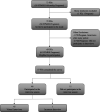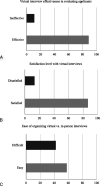Virtual Interviews During COVID-19: Perspectives of Female Pelvic Medicine and Reconstructive Surgery Program Directors
- PMID: 33086259
- PMCID: PMC8407288
- DOI: 10.1097/SPV.0000000000000982
Virtual Interviews During COVID-19: Perspectives of Female Pelvic Medicine and Reconstructive Surgery Program Directors
Abstract
Objective: The aim of the study was to evaluate female pelvic medicine and reconstructive surgery (FPMRS) fellowship program directors' opinions regarding the effectiveness of virtual interviews for selecting fellows and their future interview mode preferences.
Methods: This was a cross-sectional online survey of all FPMRS program directors in the United States conducted from April 29, 2020, to May 30, 2020. At the time of this study, there were 73 program directors and 69 obstetrics and gynecology and urology-accredited FPMRS programs nationwide. The primary outcome was to subjectively assess the effectiveness of virtual interviews as compared with in-person interviews for evaluating applicants.
Results: Fifty seven (82.6%) of the program directors completed the survey. A total of 80.7% (46/57) of the respondents had participated in interviews for the active match cycle. Of the programs that participated in the interview process, almost all conducted interviews using virtual platforms (97.8%, 45/46). Program directors who conducted interviews virtually found them effective in evaluating applicants (88.9%, 40/45) and were satisfied with the virtual interview process (86.7%, 39/45). A total of 31.1% of respondents (14/45) preferred a virtual platform to an in-person setting for future interviews, and 60% (27/45) reported that they will likely perform future interviews virtually.
Conclusions: Although the pandemic resulted in a sudden reformatting of FPMRS fellowship interviews, most program directors nationally were satisfied with the process and found virtual interviews effective for assessing applicants. More than 50% of FPMRS program directors are likely to consider the virtual format for future interviews.
Copyright © 2020 American Urogynecologic Society. All rights reserved.
Conflict of interest statement
The authors have declared they have no conflicts of interest.
Figures



References
-
- Conducting Interviews During the Coronavirus Pandemic. AAMC. Available at: https://www.aamc.org/what-we-do/mission-areas/medical-education/conducti.... Accessed May 17, 2020.
-
- Ballejos MP Oglesbee S Hettema J, et al. . An equivalence study of interview platform: does videoconference technology impact medical school acceptance rates of different groups? Adv Health Sci Educ 2018;23(3):601–610. - PubMed
-
- Chandler NM Litz CN Chang HL, et al. . Efficacy of videoconference interviews in the pediatric surgery match. J Surg Educ 2019;76(2):420–426. - PubMed
MeSH terms
LinkOut - more resources
Full Text Sources
Medical
Miscellaneous

